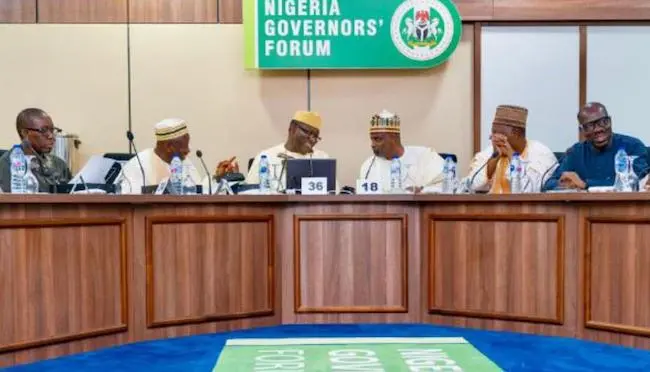As the government bemoans the payment of fuel subsidies, state employees would go without salary for months.
by Ebor Cletus Ralph Jr

After the Nigerian Governors’ Forum bemoaned the associated financial strain, the continuation of fuel subsidies may have a ripple effect on state employees across the nation.
With the help of a memo addressed to the House of Representatives, the coalition of governors voiced their displeasure.
The Reps Ad Hoc Committee’s inquiry on the amount of fuel consumed daily in Nigeria prompted this.
One of the topics the committee is looking into is how frequently PMS is consumed throughout the nation.
The memo, titled “Findings on the Volume of Fuel Consumed Daily in Nigeria,” was written to committee chairman Abdulkadir Abdullahi on July 1, 2022, and it was signed by Fatima Usman Katsina, the NGF’s legislative liaison for peace and security.
The ad hoc committee of the National Executive Council that collaborated with the Nigeria National Petroleum Corporation produced a report on the appropriate pricing of PMS in Nigeria, and the governors directed the House to it. The paper was published in November 2021.
It was chaired by Governor of Kaduna State, Nasir el-Rufai, and had governors of Edo, Jigawa, Ebonyi, Akwa Ibom and Ekiti, as well as the Governor of the Central Bank of Nigeria; Minister of Finance, Budget and National Planning; Accountant-General of the Federation, Group Managing Director of the NNPC and the Permanent Secretary, MBNP.
The memo partly reads, “Although the operating environment has significantly worsened since the report was released, with NNPC now consistently reporting zero remittance to the Federation Accountant as profit from joint venture, production sharing contract and miscellaneous operations, the position of the forum remains generally the same.”
The NGF further recalled how the report noted that the “federation (FAAC) net oil & gas revenues have been declining since 2019 and are projected to decline significantly in 2022 by between N3bn and up to N4.4bn unless action is taken now.
“The following are some of the major findings relating to the volume of fuel consumed in the country:
• Remittances to the Federation Account Allocation
• Committee have continued to shrink as NNPC recovers shortfall quite arbitrarily.
• Federation’s crude oil sales revenue. FAAC deductions for PMS subsidy are above 2019 levels, even without adjusting for reduced purchasing power of the naira due to inflation and FX rate deterioration.”
The memo further revealed an analysis of the PMS consumption across states with its attendant ripple effects on remittances into the Federation account.
“An analysis of the average monthly PMS consumption by states showed that a third of the country accounts for over 65 per cent consumption of PMS. The analysis showed that the following States of Lagos, Oyo, Ogun, Abuja, Delta, Kano, Kwara, Edo, Rivers, Kaduna, Kebbi and Adamawa accounted for 65 per cent of PMS consumption in the country. Most states with high PMS consumption either have borders with neighbouring countries or are in close proximity, this has been an avenue for smugglers to benefit from profitable arbitrage opportunities in PMS pricing.
“In the current fiscal regime, remittances to FAAC would continue to shrink as NNPC recovers this shortfall from the Federation as a result of crude oil price recovery. The report recommended a PMS pricing structure that addresses regional arbitrage and smuggling of PMS and provides additional revenue to the Federation Account. There is a significant market opportunity for additional export revenue streams for Nigeria to be had given the price parity with our neighbouring countries.
“The only urgent solutions for alleviating the pressure on government budgets and maximising socially responsible profit gain” are increased accountability and transparency regarding oil and gas income,” the memo read.



